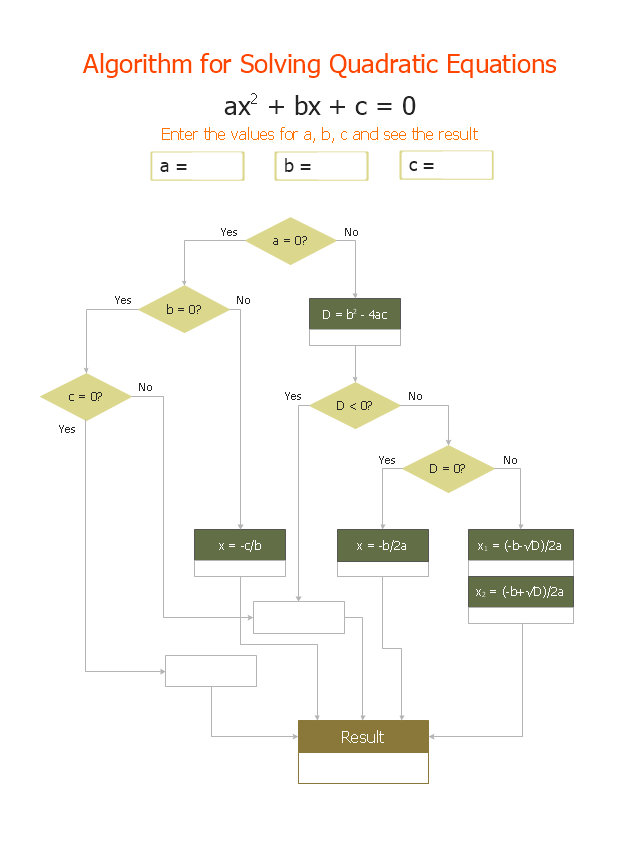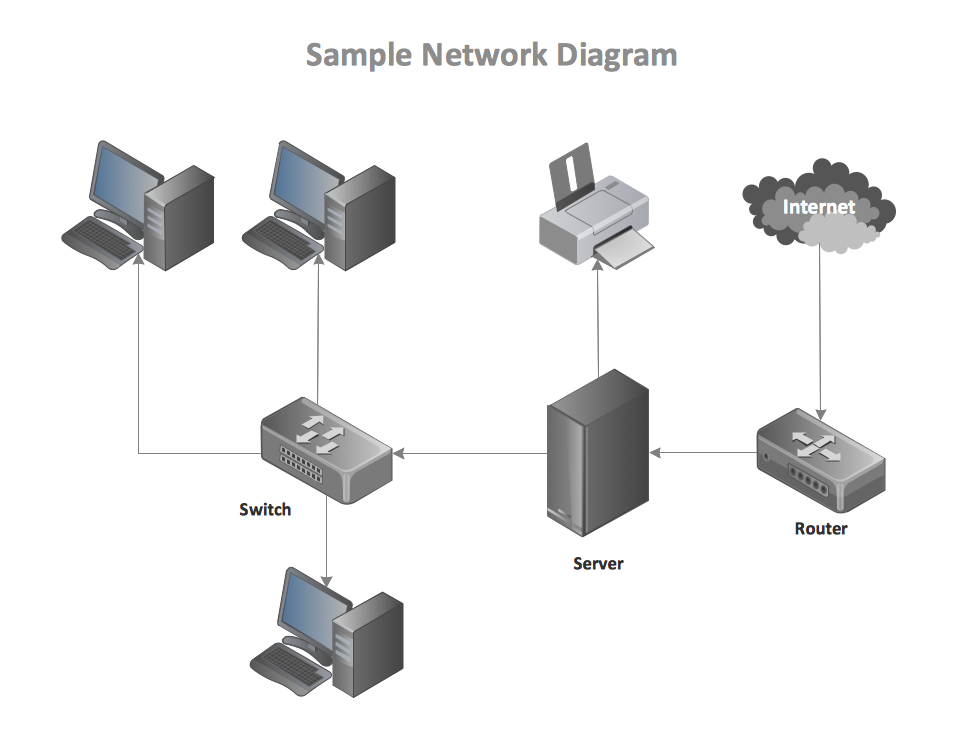"In elementary algebra, a quadratic equation (from the Latin quadratus for "square") is any equation having the form
ax^2+bx+c=0
where x represents an unknown, and a, b, and c are constants with a not equal to 0. If a = 0, then the equation is linear, not quadratic. The constants a, b, and c are called, respectively, the quadratic coefficient, the linear coefficient and the constant or free term.
Because the quadratic equation involves only one unknown, it is called "univariate". The quadratic equation only contains powers of x that are non-negative integers, and therefore it is a polynomial equation, and in particular it is a second degree polynomial equation since the greatest power is two.
Quadratic equations can be solved by a process known in American English as factoring and in other varieties of English as factorising, by completing the square, by using the quadratic formula, or by graphing." [Quadratic equation. Wikipedia]
The flowchart example "Solving quadratic equation algorithm" was created using the ConceptDraw PRO diagramming and vector drawing software extended with the Mathematics solution from the Science and Education area of ConceptDraw Solution Park.
ax^2+bx+c=0
where x represents an unknown, and a, b, and c are constants with a not equal to 0. If a = 0, then the equation is linear, not quadratic. The constants a, b, and c are called, respectively, the quadratic coefficient, the linear coefficient and the constant or free term.
Because the quadratic equation involves only one unknown, it is called "univariate". The quadratic equation only contains powers of x that are non-negative integers, and therefore it is a polynomial equation, and in particular it is a second degree polynomial equation since the greatest power is two.
Quadratic equations can be solved by a process known in American English as factoring and in other varieties of English as factorising, by completing the square, by using the quadratic formula, or by graphing." [Quadratic equation. Wikipedia]
The flowchart example "Solving quadratic equation algorithm" was created using the ConceptDraw PRO diagramming and vector drawing software extended with the Mathematics solution from the Science and Education area of ConceptDraw Solution Park.
Basic Network Diagram
The Basic Network Diagram is an easy and effective way to design and document a simple network, it lets to represent visually and logically how the different network devices and computer equipment can be installed to meet the main business needs. ConceptDraw DIAGRAM software supplied with Computer Network Diagrams solution from the Computer and Networks area of ConceptDraw Solution Park is a perfect tool for drawing the Basic Computer Network diagrams, designs, schematics, and maps, network architectures, topologies, and layouts. Numerous vector libraries of network symbols, icons and components are incredibly helpful for IT and telecom engineers, stakeholders and end-users when designing Basic Network Diagrams, Common Network Diagrams, Common Network Topologies, 10Base-T Star Network Topologies, Bus Topology Diagrams, Communication Network Diagrams, System Designs, Regional Cable Head-End Diagrams, etc. Collection of predesigned samples and templates included to Computer Network Diagrams solution also greatly extends the capabilities of ConceptDraw DIAGRAM users.
- Solving quadratic equation algorithm - Flowchart | Basic Flowchart ...
- Algorithm Of Program That Can Solve Any Quadratic Equation
- Solving quadratic equation algorithm - Flowchart | Program To Find ...
- Solving quadratic equation algorithm - Flowchart | Program ...
- Basic Diagramming | Solving quadratic equation algorithm ...
- Solving quadratic equation algorithm - Flowchart | Factoring ...
- Solving quadratic equation algorithm - Flowchart | Program And ...
- Solving quadratic equation algorithm - Flowchart | C Programming ...
- Algorithm Of Program Of Solutions Of Quadratic Equation
- Solving quadratic equation algorithm - Flowchart | Software ...
- Solving quadratic equation algorithm - Flowchart | Basic Flowchart ...
- Euclidean algorithm - Flowchart | Solving quadratic equation ...
- Algorithm And Fflowchart For C Program To Solve Quadratic Equation
- Basic Flowchart Symbols and Meaning | Euclidean algorithm ...
- Solving quadratic equation algorithm - Flowchart | Program Structure ...
- Basic Diagramming | Solving quadratic equation algorithm ...
- Design A Program Flow Chart To Compute Any Quadratic Equation
- Programming In Vb To Solve Quadratic Equation Using Flow Chart
- Bio Flowchart Lite | Solving quadratic equation algorithm - Flowchart ...
- Solving quadratic equation algorithm - Flowchart | Multi Layer Venn ...

